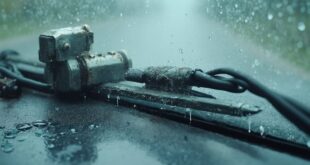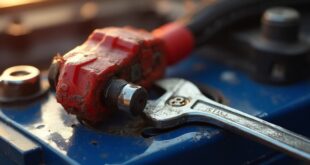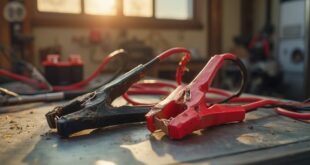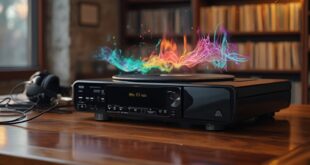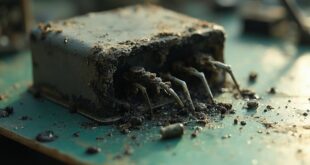To clean electrical contacts at home, start by disconnecting the power source. Use rubbing alcohol and a soft cloth to remove residue or a stiff brush for stubborn dirt. For corrosion, mix baking soda with water, scrub the terminals, rinse, and dry. Specialty cleaners like WD-40 can tackle tough spots. Finally, use compressed air to blow away debris and polish connector pins with sandpaper or an eraser. Keep going to discover more helpful tips and methods!
Importance of Cleaning Electrical Contacts
While you mightn't think about it often, cleaning electrical contacts is essential for maintaining the efficiency and reliability of your devices. Dirt and corrosion can accumulate on these connections, leading to performance issues and frustrating malfunctions.
For instance, a blocked connection might prevent your engine from starting or disrupt your trailer lights. Regular maintenance helps you avoid these problems, ensuring smooth operation of essential systems.
Plus, cleaning contacts when they're still relatively clean makes the process easier. By being proactive, you can greatly reduce the chances of unexpected breakdowns and costly repairs, keeping your devices in top shape.
Tools and Materials Needed
To effectively clean electrical contacts, you'll need a few essential tools and materials.
Start with rubbing alcohol and a soft cloth or cotton swabs for residue removal. Compressed air can help blow away loose debris.
You might also want baking soda mixed with water for corrosion. A stiff brush or toothbrush will assist in scrubbing away stubborn dirt.
For polishing connectors, grab some fine sandpaper or a pencil eraser.
Finally, consider a specialty cleaner like WD-40 Electrical Contact Cleaner for tough jobs.
With these items on hand, you're ready to tackle any cleaning task efficiently.
Step-by-Step Cleaning Process
Cleaning electrical contacts doesn't have to be complicated; just follow these straightforward steps for ideal results.
First, disconnect the power source and remove any cables.
If you're using baking soda, mix it with water, apply it to the terminals, and scrub with a stiff brush. Rinse with distilled water and dry thoroughly.
For stubborn corrosion, spray a specialty cleaner like WD-40 Electrical Contact Cleaner, allowing it to penetrate. Use compressed air to blow away debris.
Finally, polish connector pins with sandpaper or a pencil eraser. Reconnect everything, and you're all set to enjoy improved performance!
Tips for Maintaining Clean Electrical Contacts
Maintaining clean electrical contacts is essential for ensuring ideal performance and preventing malfunctions. Regularly inspect your connections to catch any dirt or corrosion early on.
Use compressed air or a gentle brush to remove loose debris. Whenever you work on your electrical systems, apply a small amount of electrical contact cleaner to keep contacts free from contaminants.
Additionally, avoid over-tightening connections, as this can damage components and create gaps for dirt. Ultimately, store your equipment in a dry place to minimize moisture exposure, which can lead to corrosion.
Staying proactive will save you time and hassle in the long run.
Common Automotive Issues Related to Dirty Contacts
Neglecting to keep electrical contacts clean can lead to a range of automotive issues that mimic more severe problems.
You might find your engine struggling to start, which could be mistaken for a dead battery or a faulty alternator. Additionally, dirty connections can affect the electrical flow to sensors, relays, and switches, causing erratic behavior.
Exterior lighting problems may arise too, often appearing as bulb failures when the real issue lies in the contacts.
Cleaning these components is usually more cost-effective than replacing them, so inspect and clean before jumping to conclusions about faulty parts.
Frequently Asked Questions
How Often Should I Clean Electrical Contacts?
You should clean electrical contacts regularly, ideally every few months or whenever you notice performance issues. Proactive maintenance helps prevent malfunctions and keeps your devices running smoothly, saving you time and potential costly repairs.
Can I Use Water Alone for Cleaning?
You can't rely solely on water for cleaning electrical contacts. While it can help remove some dirt, it won't effectively tackle corrosion or residue, which specialized cleaners or baking soda mixtures handle much better.
Is It Safe to Clean While Components Are Powered?
It's not safe to clean powered components. You risk electrical shock and damage. Always turn off the power first, ensuring your safety and preventing potential issues. Prioritize caution for effective and secure cleaning.
What Should I Do if Contacts Are Severely Corroded?
If contacts are severely corroded, you should use a specialty cleaner like WD-40 Electrical Contact Cleaner. Apply it generously, let it penetrate, and gently scrub with a soft brush to restore conductivity effectively.
Are There Any Homemade Cleaners I Should Avoid?
You should avoid using harsh chemicals like vinegar or bleach, as they can damage electrical components. Stick to gentle mixtures or specialty cleaners designed for electronics to guarantee you're not harming your connections while cleaning.
 Car Service Land Coupons for Oil change, Tires, Wheel alignment, Brakes, Maintenance
Car Service Land Coupons for Oil change, Tires, Wheel alignment, Brakes, Maintenance
